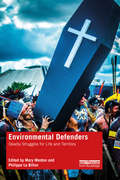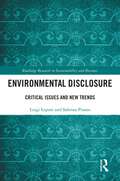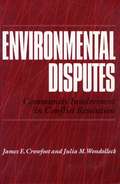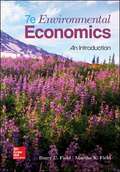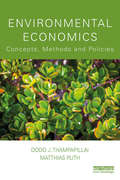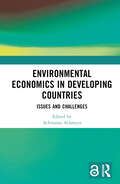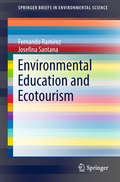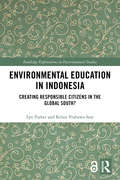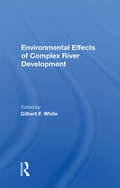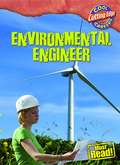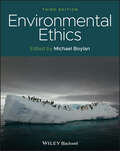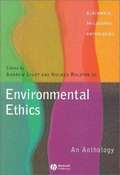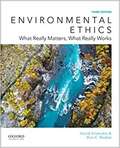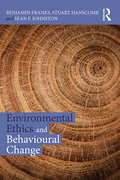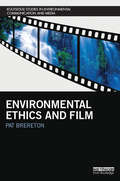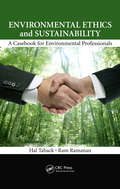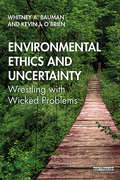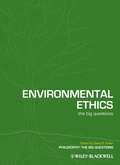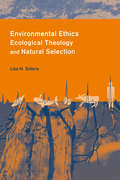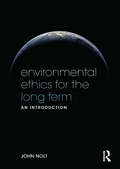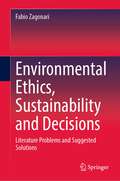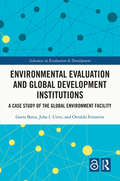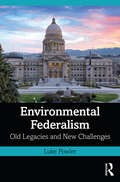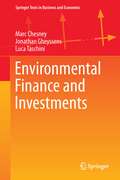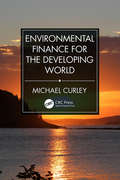- Table View
- List View
Environmental Defenders: Deadly Struggles for Life and Territory (Routledge Explorations in Environmental Studies)
by Mary Menton; Philippe Le BillonThis book is about environmental defenders and the violence they face while seeking to protect their land and the environment. Between 2002 and 2019, at least two thousand people were killed in 57 countries for defending their lands and the environment. Recent policy initiatives and media coverage have provided much needed attention to the protection and support of defenders, but there has so far been little scholarly work. This edited volume explains who these defenders are, what threats they face, and what can be done to help support and protect them. Delving deep into the complex relations between and within communities, corporations, and government authorities, the book highlights the diversity of defenders, the collective character of their struggles, the many drivers and forms of violence they are facing, as well as the importance of emotions and gendered dimensions in protests and repression. Drawing on global case studies, it examines the violence taking place around different types of development projects, including fossil fuels, agro-industrial, renewable energy, and infrastructure. The volume also examines the violence surrounding conservation projects, including through militarized wildlife protection and surveillance technologies. The book concludes with a reflection on the perspectives of defenders about the best ways to support and protect them. It contrasts these with the lagging efforts of an international community often promoting economic growth over the lives of defenders. This volume is essential reading for all interested in understanding the challenges faced by environmental defenders and how to help and support them. It will also appeal to students, scholars and practitioners involved in environmental protection, environmental activism, human rights, social movements and development studies.
Environmental Disclosure: Critical Issues and New Trends (Routledge Research in Sustainability and Business)
by Luigi Lepore Sabrina PisanoThis book provides a description of the state of the art on environmental disclosure, illustrating the key theoretical issues, the regulatory frameworks, the main standards developed and reporting the results of an empirical analysis on the environmental disclosure released by listed firms. Luigi Lepore and Sabrina Pisano begin by analysing the origin and evolution of environmental disclosure. They go on to provide a description of the main theoretical frameworks used by scholars, explaining the conceptual basis of each theory and describing how the specific theory has been used to explain the company’s decision to release environmental disclosure. The second part of the book highlights the role and evolution of the European regulatory frameworks, emphasizing the transition from voluntary to mandatory disclosure. The book ends by providing a picture of the evolution of sustainability reporting practices in European Union nations over the past two decades. This book investigates the critical issues and new directions in environmental disclosure, which are currently under examination by regulators and standard setters. It will therefore be of great interest to academics and students working in the areas of business and sustainability.
Environmental Disputes: Community Involvement In Conflict Resolution (Environment, Development And Public Policy: Environmental Policy And Planning Ser.)
by Julia M. Wondolleck James CrowfootEnvironmental Disputes helps citizen groups, businesses, and governments understand how Environmental Dispute Settlement--a set of procedures for settling disputes over environmental policies without litigation--can work for them.
Environmental Economics: An Introduction (Seventh Edition)
by Barry C. Field Martha K. FieldEnvironmental Economics is an introduction to the basic principles of environmental economics as they have been developed in the past and as they continue to evolve. The examples discussed in this textbook represent only a sample of the full range of issues that actually exists. For this reason, the Seventh Edition sticks to the basic ideas and ways that environmental economists have found to make the basic concepts and models more specific and relevant to concrete environmental issues. The basic structure and sequence of chapters are unchanged but contain new and updated material that reflects the new research efforts by environmental economists over the last few years.
Environmental Economics: Concepts, Methods and Policies (New Horizons In Environmental Economics Ser.)
by Dodo J. Thampapillai Matthias RuthEnvironmental Economics explores the ways in which economic theory and its applications, as practised and taught today, must be modified to explicitly accommodate the goal of sustainability and the vital role played by environmental capital. Pivoting around the first and second laws of thermodynamics, as well as the principles of ecological resilience, this book is divided into five key parts, which includes extensive coverage of environmental microeconomics and macroeconomics. It drills down into issues and challenges including consumer demand; production and supply; market organisation; renewable and non-renewable resources; environmental valuation; macroeconomic stabilisation, and international trade and globalisation. Drawing on case studies from forestry, water, soil, air quality, and mining, this book will equip readers with skills that enable the analyses of environmental and economic policy issues with a specific focus on the sustainability of the economy. Rich in pedagogical features, including key concepts boxes and review questions at the end of each chapter, this book will be a vital resource for upperlevel undergraduate and postgraduate students studying not only environmental economics/ecological economics but also economics in general.
Environmental Economics in Developing Countries: Issues and Challenges
by Achiransu AcharyyaThe COVID-19 pandemic has laid bare the vulnerabilities of socio-economic systems globally and exposed the risks that natural capital degradation imposes on human health, economy, and society. This book studies the environmental challenges faced by developing economies in a post-COVID-19 world. Exploring diverse case studies from South Asia and Sub-Saharan Africa, the volume discusses the impact that economic development and, recently, COVID-19 has had on the environment, ecology, and economy of these regions. It analyses nature conservation policies aimed at minimizing ecological damage arising from economic development and discusses the policy objectives of sustainable development. It also highlights the significant role that environmental economics networks have played in capacity building, framing of policies using ecological economics tools, and developing a local leadership trained in addressing local sustainability issues. An important contribution to the study of environmental economics of the Global South, the book will be of interest to students and researchers of economics, environment, development studies, development economics, environmental policies, and South Asia studies. It will also be useful for policymakers and NGOs working in this field.
Environmental Education and Ecotourism (SpringerBriefs in Environmental Science)
by Fernando Ramírez Josefina SantanaThis SpringerBrief focuses on the principles of ecotourism such as relevance of the field, origin, fundamental aspects, definitions, philosophy, implications in biodiversity conservation and environmental impacts. Special emphasis is also given to the interaction between ecotourism and education and it is supported by recent publications from the authors.
Environmental Education in Indonesia: Creating Responsible Citizens in the Global South? (Routledge Explorations in Environmental Studies)
by Lyn Parker Kelsie Prabawa-SearIndonesia’s wealth of natural resources is being exploited at breakneck speed, and environmental awareness and knowledge among the populace is limited. This book examines how young people learn about the environment to see how education can help to develop environmental awareness and avert vast environmental destruction, not only in Indonesia, but also in the Global South more generally. Based on in-depth studies conducted in the cities of Yogyakarta and Surabaya, complemented with surveys of students in secondary schools, Environmental Education in Indonesia examines educational curricula, pedagogy and "green" activities to reveal what is currently being done in schools to educate children about the environment. The book investigates the shortcomings in environment education, including underqualified teachers, the civil service mentality, the still-pervasive chalk-and-talk pedagogy and the effect of the examination system. It also analyses the role of local government in supporting (or not) environmental education, and the contribution of environmental NGOs. The book establishes that young people are not currently being exposed to effective environmental education, and the authors propose that the best and most culturally appropriate way forward in Indonesia is to frame pro-environment behaviour and responsibility as a form of citizenship, and specifically that environmental education should be taught as a separate subject. This book will be of great interest to students and scholars of contemporary Indonesia and Southeast Asia, education for sustainability and environmental education, as well as sustainability and sustainable development more generally.
Environmental Effect/h: International Experience
by Gilbert F. WhiteIn our critical attempts to solve the pressing current problems of a limited water supply, it is essential that we act always with a global view to the future. Recognizing this, an international group of scholars—from the Soviet Union, Canada, Africa, and the United States—met to review together their experiences and research on the environmental effects of a number of large scale river management programs. This edited collection of their reports provides a balanced view of a vital element in the total ecosystem. Their analysis points out the urgent need to take account of long-term trends in climate, to consider all feasible management alternatives, and, especially, to manage demand (as opposed to simply increasing water supply) and to defer irreversible action until all environmental impacts are estimated.
Environmental Engineer (Cool Cutting Edge Careers)
by Geoffrey M. HornHow can we keep our drinking water pure? Whats the best way to dispose of our waste? How can we limit pollution? Answering these questions is the job of environmental engineers. Using the latest technology and research, environmental engineers are changing our world. Learn about the many different jobs that make up this cutting-edge career.
Environmental Ethics
by Michael BoylanThe latest edition of an essential resource in the theory and applications of environmental ethics In the newly revised Third Edition of Environmental Ethics, internationally renowned philosopher Michael Boylan delivers another accessible introduction for students new to ethics, and an invaluable reference for scholars of all levels. The anthology includes important essays, both established and contemporary, as well as eight brand-new contributions commissioned specifically for this edition. This new material is the foundation for students# understanding of the most recent ethical debates on the environment and humanity's place within it. The balanced combination of new material on recent developments in the field and well-known, foundational articles appears alongside helpful pedagogical materials, including case studies and sample questions. The book brings students up to speed on all the main themes in the area, including worldview arguments for environmentalism, the anthropocentric vs. biocentric debate, and a variety of applied environmental problems. Environmental Ethics also offers: A thorough introduction to the theoretical background of environmental ethics, including discussions of ethical reasoning, nature, and the tragedy of the commons Comprehensive explorations of eco-feminism and social justice, aesthetics, and deep ecology Practical discussions of anthropocentric and biocentric justifications in environmental ethics In-depth examinations of applied environmental problems, including climate change, animal rights, sustainability, and public policy Perfect for undergraduate and graduate students studying topics in ethics, the environment, law, and policy, Environmental Ethics will also earn a place in the libraries of philosophers with an interest in applied or environmental ethics, and industry consultants to ecologists, environmental scientists, or environmental policymakers.
Environmental Ethics: An Anthology
by Andrew Light Holmes Rolston IIIEnvironmental Ethics: An Anthology brings together both classic and cutting-edge essays which have formed contemporary environmental ethics, ranging from the welfare of animals versus ecosystems to theories of the intrinsic value of nature.
Environmental Ethics: What Really Matters, What Really Works
by David Schmidtz Dan C. ShaharSignificantly revised in this third edition, Environmental Ethics: What Really Matters, What Really Works examines morality from an environmental perspective. Featuring accessible selections from classic articles to examples of cutting edge original research it addresses both theory and practice. <p><p> Asking what really matters, the first section of the book explores the abstract ideas of human value and value in nature. The second section turns to the question of what really works what it would take to solve our real world environmental problems. Moving beyond the "hype," it presents authoritative essays on applying environmental ethics to the issues that matter right now. The selections present philosophical, biological, and socially scientific approaches to the major issues. Environmental Ethics also features first hand descriptions from people who have actually been involved in wildlife and conservation initiatives.
Environmental Ethics and Behavioural Change
by Benjamin Franks Stuart Hanscomb Sean F. JohnstonEnvironmental Ethics and Behavioural Change takes a practical approach to environmental ethics with a focus on its transformative potential for students, professionals, policy makers, activists, and concerned citizens. Proposed solutions to issues such as climate change, resource depletion and accelerating extinctions have included technological fixes, national and international regulation and social marketing. This volume examines the ethical features of a range of communication strategies and technological, political and economic methods for promoting ecologically responsible practice in the face of these crises. The central concern of the book is environmental behaviour change: inspiring, informing and catalysing reflective change in the reader, and in their ability to influence others. By making clear the forms of environmental ethics that exist, and what each implies in terms of individual and social change, the reader will be better able to formulate, commit to, articulate and promote a coherent position on how to understand and engage with environmental issues. This is an essential companion to environmental ethics and philosophy courses as well as a great resource for professionals interested in practical approaches to environmental ethics. It is also excellent supplementary reading for environmental studies, environmental politics and sustainable consumption courses.
Environmental Ethics and Film (Routledge Studies in Environmental Communication and Media)
by Pat BreretonEnvironmental ethics presents and defends a systematic and comprehensive account of the moral relation between human beings and their natural environment and assumes that human behaviour toward the natural world can and is governed by moral norms. In contemporary society, film has provided a powerful instrument for the moulding of such ethical attitudes. Through a close examination of the medium, Environmental Ethics and Film explores how historical ethical values can be re-imagined and re-constituted for more contemporary audiences. Building on an extensive back-catalogue of eco-film analysis, the author focuses on a diverse selection of contemporary films which target audiences’ ethical sensibilities in very different ways. Each chapter focuses on at least three close readings of films and documentaries, examining a wide range of environmental issues as they are illustrated across contemporary Hollywood films. This book is an invaluable resource for students and scholars of environmental communication, film studies, media and cultural studies, environmental philosophy and ethics.
Environmental Ethics and Sustainability: A Casebook for Environmental Professionals
by Hal Taback Ram RamananThe environmental professional must be educated to be ethical, and more importantly, trained through frequent participatory workshops with real-world scenarios to be able to make the right choices when faced with environmental dilemmas. This book serves as a reference and a resource casebook, presenting current real-world situations and providing perspectives to numerous environmental ethics scenarios. It provides specific guidance as to what is ethical behavior, how to judge it, and the foundations of ethical behavior in facing and resolving environmental ethical dilemmas.
Environmental Ethics and Uncertainty: Wrestling with Wicked Problems
by Whitney A. Bauman Kevin J. O'BrienThis book offers a multidisciplinary environmental approach to ethics in response to the contemporary challenge of climate change caused by globalized economics and consumption. This book synthesizes the incredible complexity of the problem and the necessity of action in response, highlighting the unambiguous problem facing humanity in the 21st century, but arguing that it is essential to develop an ethics housed in ambiguity in response. Environmental Ethics and Uncertainty is divided into theoretical and applied chapters, with the theoretical sections engaging in dialogue with scholars from a variety of disciplines, while the applied chapters offer insight from 20th century activists who demonstrate and/or illuminate the theory, including Martin Luther King, Rachel Carson, and Frank Lloyd Wright. This book is written for scholars and students in the interdisciplinary field of environmental studies and the environmental humanities, and will appeal to courses in religion, philosophy, ethics, politics, and social theory.
Environmental Ethics:The Big Questions
by David R. KellerThe author, through theories from philosophy, economics, history and life sciences, tries to explain the bond between the human and non human origins and existence on this planet.
Environmental Ethics, Ecological Theology, and Natural Selection: Suffering and Responsibility (Columbia Series in Science and Religion)
by Lisa SiderisIn the last few decades, religious and secular thinkers have tackled the world's escalating environmental crisis by attempting to develop an ecological ethic that is both scientifically accurate and free of human-centered preconceptions. This groundbreaking study shows that many of these environmental ethicists continue to model their positions on romantic, pre-Darwinian concepts that disregard the predatory and cruelly competitive realities of the natural world. Examining the work of such influential thinkers as James Gustafson, Sallie McFague, Rosemary Radford Ruether, John Cobb, Peter Singer, and Holmes Rolston, Sideris proposes a more realistic ethic that combines evolutionary theory with theological insight, advocates a minimally interventionist stance toward nature, and values the processes over the products of the natural world.
Environmental Ethics for the Long Term: An Introduction
by John NoltBroad in scope, this introduction to environmental ethics considers both contemporary issues and the extent of humanity's responsibility for distant future life. John Nolt, a logician and environmental ethicist, interweaves contemporary science, logical analysis, and ethical theory into the story of the expansion of ethics beyond the human species and into the far future. Informed by contemporary environmental science, the book deduces concrete policy recommendations from carefully justified ethical principles and ends with speculations concerning the deepest problems of environmental ethics. Pedagogical features include chapter outlines, annotated suggestions for further readings, the explanations of key terms when first mentioned, and an extensive glossary.
Environmental Ethics, Sustainability and Decisions: Literature Problems and Suggested Solutions
by Fabio ZagonariThis book provides a summary of the main concepts involved in environmental ethics, sustainability and decisions and a consistent sequence of environmental ethics, sustainability and decisions. It presents many environmental ethics, by focusing on maximising welfare within teleological approaches and minimising inequalities within deontological approaches. It presents many sustainability paradigms, by focusing on weak sustainability to maximise welfare and strong sustainability to minimise inequalities. Two main decisions are presented by focusing on policies (taxes, standards, subsidies, permits, protected areas, exploitation rights) and projects (CBA) towards efficiency to maximise welfare and policies (national laws/regulations, bilateral/multilateral agreements) and projects (MCA) towards equity to minimise inequalities.
Environmental Evaluation and Global Development Institutions: A Case Study of the Global Environment Facility (Advances in Evaluation & Development)
by Juha I. Uitto Osvaldo N. Feinstein Geeta BatraEvaluation is increasingly important for finding sustainable solutions for the people and the planet, based on a systematic analysis of what works, for whom, and under what circumstances, and to contribute to the achievement of the Sustainable Development Goals, as they pertain to the environment. This book explores why the Global Environment Facility (GEF) invests in evaluation for accountability and learning to inform its decision-making on programming priorities, and how this leads to wiser funding decisions and better program performance on the ground. The book is based on real-life experiences of how to make evaluation count for international environmental action. Drawing upon comprehensive evaluations of the GEF, it provides unique insights from authors responsible for designing, implementing, and disseminating the findings of the evaluations. No other multilateral development or environment agency places evaluation fully at the center of their decision-making. The book outlines the trends in the global environment and the changing landscape of international environmental finance. It defines the role of the GEF and explains its institutional framework and the unique partnership that involves donor and recipient countries, multilateral development banks, UN agencies, nongovernmental organizations (NGOs), and national agencies in the developing countries. Further, it provides useful pointers to other organizations wishing to enhance evidence-based decision-making for improving their relevance, performance, and impact. The book will be most suitable for graduate-level, specialized study in a variety of disciplines such as environmental and development economics, political science, international relations, geography, sociology, and social anthropology.
Environmental Federalism: Old Legacies and New Challenges
by Luke FowlerIn Environmental Federalism, Luke Fowler helps to refocus much-needed attention on the role of state governments in environmental policy creation and implementation in the United States. While the national government receives most of the attention when it comes to environmental policy, state governments play a vital role in protecting our natural resources. Legacy problems, like air, water, and land pollution, present one set of challenges for environmental federalism, but new problems emerging as a result of climate change further test the bounds of federal institutions. Examining patterns of pollution and case studies from the Clean Air Act and the Clean Water Act, Fowler explores two questions: has environmental federalism worked in managing legacy environmental problems, and can it work to manage climate change? In order to answer these questions, Fowler extends James Lester’s typology using political incentives and administrative capacities to identify four types of states (progressive, delayers, strugglers, and regressives) and assesses how they are linked to the success of federal environmental programs and conf licts in intergovernmental relations. He then considers what lessons we can learn from these programs and whether those lessons can help us better understand climate policy and multi-level institutions for environmental governance. This timely read will be a valuable contribution to students, researchers, and scholars of political science, public policy, public administration, and environmental studies.
Environmental Finance and Investments
by Jonathan Gheyssens Marc Chesney Luca TaschiniThe current economic and environmental situation poses fundamental questions that this book aims to answer: Under which conditions could a market-based approach contribute to a decrease in emissions? How are abatement and investment strategies generated or promoted under permit regimes like the European Union Emission Trading Scheme (EU ETS)? In the context of the EU ETS, what is the trade-off between production, technological changes and pollution? This book is intended to provide students and practitioners the knowledge and theoretical tools they need in order to answer these and other more general questions in the context of so-called environmental finance theory, a new field of research that investigates the economic, financial and managerial impacts of market-based environmental policies.
Environmental Finance for the Developing World
by Michael CurleyFinancing the Global Environment examines the financial techniques and strategies necessary to obtain funding to undertake infrastructure and environmental projects. Despite conventional notions that monies are typically not readily available for large-scale environmental projects, the book explains how this is usually not the case, and will provide the necessary steps, tools, and organizational methods necessary for successful project finance in any region. It demonstrates how the largest possible projects could be undertaken at the lowest possible cost and how a utility’s excess operating income could be used to improve the system. Features: Presents methods for the sourcing of funds and for maximizing income Defines what types of income can be used for making debt service payments and how it can be estimated Explains the basic concepts of loans and debt, as well as the present value theory of money This book serves as a useful guide for practicing professionals, industry executives, and government officials who work with water and wastewater utilities and infrastructure and are involved with financial project preparation.
